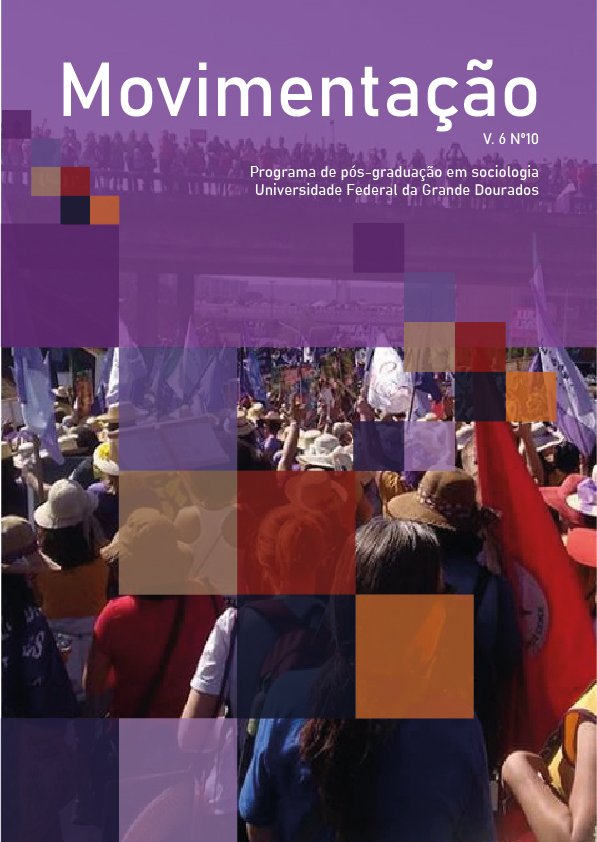Mulheres à frente no Cerrado e Pantanal: o entrelaçar de força na prática da resistência
DOI:
https://doi.org/10.30612/mvt.v6i10.10594Palavras-chave:
Mulheres. Meio Ambiente. Auto-organização. Resistência.Resumo
Pela perspectiva feminista que considera a auto-organização das mulheres um instrumento de luta histórica na resistência das desigualdades, este artigo tem por finalidade apresentar o entrelaçar das forças que movimentam mulheres de comunidades tradicionais e populações locais do Cerrado e Pantanal Sul-mato-grossense revelando aspectos que circundam suas vidas no que diz respeito a forma de organização social, territorial, política e econômica. Em um drástico cenário de falta de acesso a direito humanos básicos, exploração e degradação dos recursos naturais, há uma realidade orgânica nos territórios que define estratégias para criação de bem-estar e soberania, frente as condições de pobreza, expropriação e violação de direitos. Esta realidade é composta por ações praticadas por mulheres no auto- reconhecimento de suas identidades e papel político nas comunidades, que ver-se-á a seguir.Downloads
Referências
ÁVILA, Maria Betânia. Mulher e Natureza: dos sentidos da dominação no capitalismo e no sistema patriarcal. In: Instituto Equit Gênero, Economia e Cidadania Global (Org.). Mulheres na Rio + 20. Rio de Janeiro: Instituto Equit, 2013. Págs 71 a 81.
DUARTE, Raquel Cristina Pereira. O ecofeminismo e a luta pela igualdade de gênero: uma análise à luz da teoria bidimensional da justiça. Dissertação (Mestrado) – Universidade de Caxias do Sul, Programa de Pós-Graduação em Direito, 2015.
ECOA. Pantanal. Disponível em: https://ecoa.org.br/dados-do-pantanal/. Acesso em: 04 de julho de 2019.
ECOA. Reaprendendo com os ciclos hidrológicos do Pantanal. 2017. Disponível em: https://ecoa.org.br/reaprendendo-com-os-ciclos-hidrologicos-do-pantanal/. Acesso em: 27 de outubro de 2019.
INSTITUTO INTERNACIONAL DE EDUCAÇÃO NO BRASIL. Qual a importância do Cerrado para a biodiversidade global? Disponível em: http://cepfcerrado.iieb.org.br/qual-importancia-do-cerrado-para-biodiversidade-global/. Acesso em: 24 de outubro de 2019.
MINISTÉRIO DO MEIO AMBIENTE. Pantanal. Disponível em: https://www.mma.gov.br/estruturas/sbf_chm_rbbio/_arquivos/relatoriofinal_cerrado_2008_2009_72.pdf. Acesso em: 25 de outubro de 2019.
MINISTÉRIO DO MEIO AMBIENTE. Cerrado. Disponível em: https://www.mma.gov.br/estruturas/sbf_chm_rbbio/_arquivos/relatrio_tcnico_monitoramento_pantanal_2008_2009_72.pdf. Acesso em: 25 de outubro de 2019.
RODRIGUES, Graciela. Ecofeminismo – Superando a Dicotomia Natureza/Cultura. In: Instituto Equit Gênero, Economia e Cidadania Global (Org.). Mulheres na Rio + 20. Rio de Janeiro: Instituto Equit, 2013. Págs 37 a 54.
Downloads
Publicado
Como Citar
Edição
Seção
Licença
Os autores devem aceitar as normas de publicação ao submeterem a revista, bem como, concordam com os seguintes termos:
(a) O Conselho Editorial se reserva ao direito de efetuar, nos originais, alterações da Língua portuguesa para se manter o padrão culto da língua, respeitando, porém, o estilo dos autores.
(b) Autores mantém os direitos autorais e concedem à revista o direito de primeira publicação, com o trabalho simultaneamente licenciado sob a Atribuição-NãoComercial-CompartilhaIgual 3.0 Brasil (CC BY-NC-SA 3.0 BR) que permite: Compartilhar — copiar e redistribuir o material em qualquer suporte ou formato e Adaptar — remixar, transformar, e criar a partir do material. A CC BY-NC-SA 3.0 BR considera os termos seguintes:
- Atribuição — Você deve dar o crédito apropriado, prover um link para a licença e indicar se mudanças foram feitas. Você deve fazê-lo em qualquer circunstância razoável, mas de nenhuma maneira que sugira que o licenciante apoia você ou o seu uso.
- NãoComercial — Você não pode usar o material para fins comerciais.
- CompartilhaIgual — Se você remixar, transformar, ou criar a partir do material, tem de distribuir as suas contribuições sob a mesma licença que o original.
- Sem restrições adicionais — Você não pode aplicar termos jurídicos ou medidas de caráter tecnológico que restrinjam legalmente outros de fazerem algo que a licença permita.



